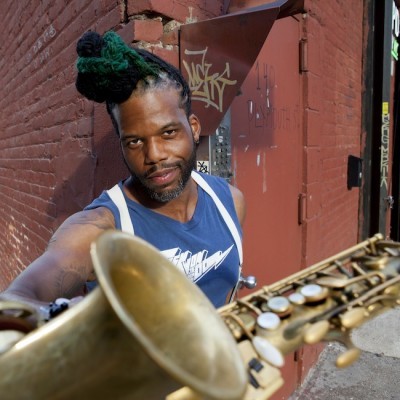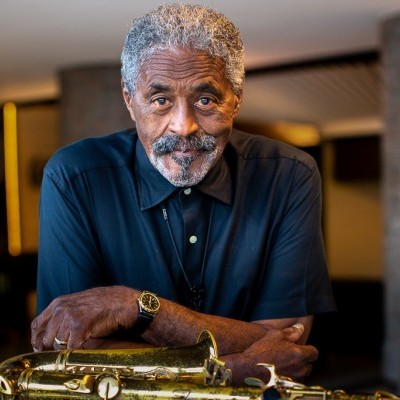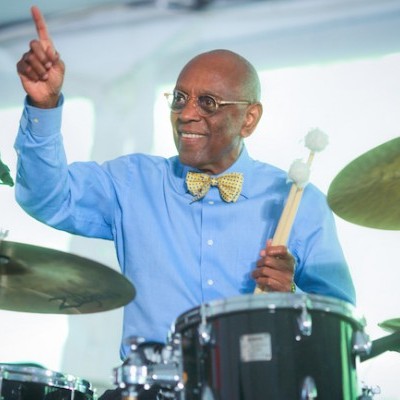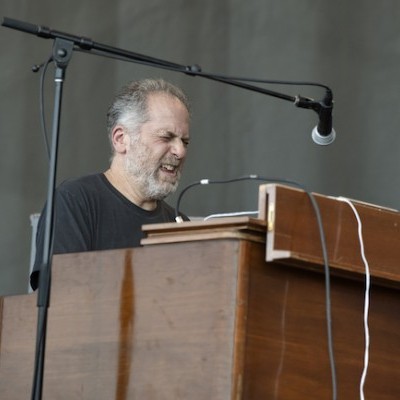Apr 2, 2024 12:59 PM
Saxophonist, Sonic Explorer Casey Benjamin Dies at 45
Casey Benjamin, the alto saxophonist, vocalist, keyboardist and producer who stamped his distinctive sounds on the…
Autobiography was a key motif of Cleveland’s 39th Tri-C JazzFest, which ran June 28-30 at Playhouse Square. Bracketed by the JazzFest debuts of Dee Dee Bridgewater and Common, who threaded their life stories through the music, the torrid weekend successfully updated a Cleveland institution.
The acts playing the State, Ohio, Allen and Hanna theaters spanned JazzFest regular Kirk Whalum, artist-in-residence Terence Blanchard, jazz collective (and lone sellout) Snarky Puppy, B-3 master Dr. Lonnie Smith and Joshua Redman’s group, Still Dreaming.
“What makes the Tri-C jazz festival unique is it’s all the colors of the rainbow aesthetically when it comes to jazz, blues, r&b, rap—all those are aspects of black culture that got this whole thing started,” Whalum said. “The harsh reality is that what we call jazz is harder to sell now, if it’s not embracing all these other things. You can still call it ‘jazz,’ but you got to know that you’ll automatically color it in such a way that a lot of people can’t get their heads around, because they didn’t grow up with it.”
Before Whalum took to the State Theatre stage, the DIVA Jazz Orchestra played politely received originals, including drummer Sherrie Maricle’s “The Rhythm Changes,” which set the stage for the night’s honors.
In conferring a Jazz Legend Award on DownBeat Publisher Frank Alkyer, Alex Johnson, Cuyahoga Community College’s president, cited the profound influence of the magazine’s jazz advocacy. Alkyer’s fellow honorees were Larry Simpson, a former Tri-C executive who was instrumental in forming JazzFest and now is provost at Berklee College of Music in Boston, and pianist Jackie Warren, a leading light on Cleveland’s jazz scene.
After a long intermission, Whalum’s group arrived. He was particularly strong on the fierce “Triage,” and his interplay with singer Vaneese Thomas, the little sister of Stax hitmaker Carla Thomas, was a high point. Thomas shone on a French version of “In This Life” and a melting “It’s What I Do.”
Whalum knows both Thomas and Bridgewater from Memphis—and Paris, where all three Memphis natives have lived. Whalum also produced Memphis … Yes, I’m Ready (OKeh), Bridgewater’s homage to her hometown.
The singer and her snappy band went on at 10:30 p.m., launched by a sharp take on The Bar-Kays’ “Soul Finger”; the high-heeled Bridgewater played for more than an hour. While her energy was striking, her autobiographical shtick diluted the songs and her interpretations were erratic. She killed on The Temptations’ “I Can’t Get Next to You,” but she slaughtered Carla Thomas’ “B-A-B-Y” and oversexed Barbara Mason’s winsome “Yes, I’m Ready.” A high point was her getting Whalum and saxophonist Bryant Lockhart to vie for her affections in a startling “Don’t Be Cruel.”
The following afternoon, tenor saxophonist Joshua Redman, trumpeter Ron Miles, bassist Scott Colley and drummer Brian Blade did more than pay tribute to Old And New Dreams, an influential group dating back to the 1970s and ’80s that featured Joshua’s father, Dewey. Still Dreaming was physical, intellectually nourishing and fantastic, filling the intimate Ohio Theatre with material from its eponymous 2017 album. The standouts were a ridiculously complex and joyous “Unanimity,” Don Cherry’s gypsy calypso “Guinea,” Dewey Redman’s “Walls-Bridges” and Ornette Coleman’s bluesy “Turnaround.” Redman’s return to Cleveland after more than 10 years was a triumph.
The 39th iteration of JazzFest concluded on a sharp, charismatic note: José James and hip-hop icon Common. James, who headed a tough band, sparked by soulful drummer Nate Smith, turned such Bill Withers hits as “Use Me” and “Grandma’s Hands” into witty modern jazz-rock. In effortless command of the stage, the user-friendly singer also deployed humor, ending several songs as if his battery was dying.
Common’s battery, meanwhile, was fully charged as he emerged from the shadows to “Nature Boy.” The MC was unsurprisingly political (“the new plantation is mass incarceration”), telling his story through hits including “I Used to Love H.E.R.,” “Black Maybe” and “It’s Your World,” his plea for a colorblind society. DB

Benjamin possessed a fluid, round sound on the alto saxophone, and he was often most recognizable by the layers of electronic effects that he put onto the instrument.
Apr 2, 2024 12:59 PM
Casey Benjamin, the alto saxophonist, vocalist, keyboardist and producer who stamped his distinctive sounds on the…

“He’s constructing intelligent musical sentences that connect seamlessly, which is the most important part of linear playing,” Charles McPherson said of alto saxophonist Sonny Red.
Feb 27, 2024 1:40 PM
“I might not have felt this way 30 to 40 years ago, but I’ve reached a point where I can hear value in what people…

Albert “Tootie” Heath (1935–2024) followed in the tradition of drummer Kenny Clarke, his idol.
Apr 5, 2024 10:28 AM
Albert “Tootie” Heath, a drummer of impeccable taste and time who was the youngest of three jazz-legend brothers…

“Both of us are quite grounded in the craft, the tradition and the harmonic sense,” Rosenwinkel said of his experience playing with Allen. “Yet I felt we shared something mystical as well.”
Mar 12, 2024 11:42 AM
“There are a few musicians you hear where, as somebody once said, the molecules in the room change. Geri was one of…

Larry Goldings’ versatility keeps him in high demand as a leader, collaborator and sideman.
Feb 21, 2024 10:45 AM
Are you having any fun? Larry Goldings certainly is. Consider just two recent examples:
Scene 1: “If anyone had…